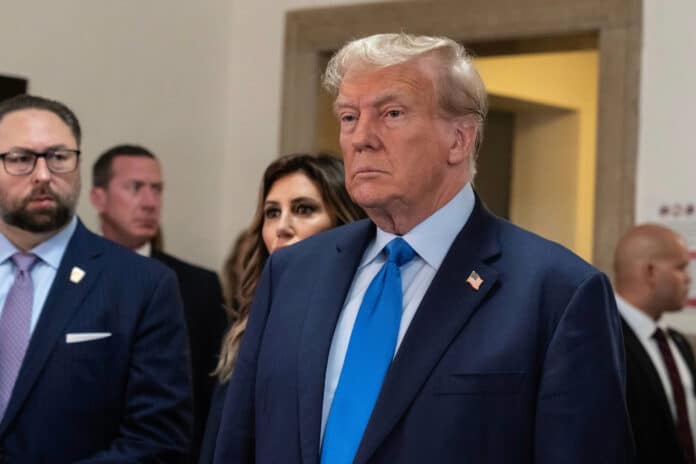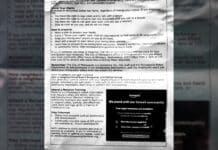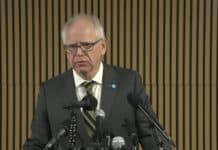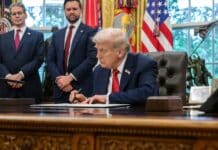
(The Center Square) — The president of the United States has “absolute immunity” when acting in his core constitutional duties, the U.S. Supreme Court ruled in a landmark decision Monday.
“At least with respect to the President’s exercise of his core constitutional powers, this immunity must be absolute,” the ruling said. “As for his remaining official actions, he is entitled to at least presumptive immunity.”
The 6-3 ruling made clear that the president has no immunity for unofficial conduct.
“As for a President’s unofficial acts, there is no immunity,” the ruling said. “Although Presidential immunity is required for official actions to ensure that the President’s decisionmaking is not distorted by the threat of future litigation stemming from those actions, that concern does not support immunity for unofficial conduct.”
The ruling comes in response to former President Donald Trump’s claim that he has presidential immunity against the charges brought against him over actions he took as president. He is the first former president to face criminal charges.
Most relevant to this ruling specifically, Trump faces charges for his role in the Jan. 6 storming of the U.S. Capitol, namely that he allegedly lied and stirred up the crowd that eventually entered the Capitol. Trump’s defenders point out he did release a video calling for peaceful protests on the day of the riot.
Chief Justice John Roberts wrote the majority opinion, saying that because this case was expedited the court did not have time to lay out the detailed differences between official and unofficial. The court also did not rule definitively on the Jan. 6 case, but sent it back to the lower courts with the new guidance laid out in the ruling.
“Certain allegations — such as those involving Trump’s discussions with the Acting Attorney General — are readily categorized in light of the nature of the President’s official relationship to the office held by that individual,” the ruling said. “Other allegations — such as those involving Trump’s interactions with the Vice President, state officials, and certain private parties, and his comments to the general public — present more difficult questions.”
The ruling also said that “whenever the President and Vice President discuss their official responsibilities, they engage in official conduct. The indictment’s allegations that Trump attempted to pressure the Vice President to take particular acts in connection with his role at the certification proceeding thus involve official conduct, and Trump is at least presumptively immune from prosecution for such conduct.”
The ruling also said that it is the government’s burden to rebut the presumption of immunity.
Supreme Court Justice Ketanji Brown Jackson and Justice Sonia Sotomayor both filed dissents to the majority opinion.
“Once self regulating, the Rule of Law now becomes the rule of judges, with courts pronouncing which crimes committed by a President have to be let go and which can be redressed as impermissible,” Jackson said in her dissent. “So, ultimately, this Court itself will decide whether the law will be any barrier to whatever course of criminality emanates from the Oval Office in the future.
“The potential for great harm to American institutions and Americans themselves is obvious.”
The court’s ruling has broad and even historic implications for future presidencies. It also means that much of the future grappling in Trump’s cases will be over whether his alleged crimes were committed in an official, and therefore protected, capacity or an unofficial one. That poses a new legal question that could itself return to the Supreme Court.
“The President enjoys no immunity for his unofficial acts, and not everything the President does is official,” the ruling said. “The President is not above the law. But under our system of separated powers, the President may not be prosecuted for exercising his core constitutional powers, and he is entitled to at least presumptive immunity from prosecution for his official acts.”
Trump faces an array of legal woes, including his May conviction on 34 accounts related to his hush money payments to adult film actress Stormy Daniels. Trump also faces charges in Georgia, Florida and Washington, D.C. for his handling of classified documents, the Jan. 6 issue and more.
Leading up to this ruling, Trump has repeatedly and publicly made his argument that a president should not be afraid of criminal prosecution from his political rivals for making tough decisions while in office. He argues his prosecution will start a vicious cycle of presidents facing prosecution from political opponents after leaving office.
“Without Presidential Immunity, a President of the United States literally could not function! It should be a STRONG IMMUNITY, where proper decisions can be made, where our Country can be POWERFUL and THRIVE, and where Opponents cannot hold up and extort a Future President for Political Gain,” Trump said in a statement Sunday. “It is a BIG decision, an important decision, a decision which can affect the Success or Failure of our Country for decades to come. We want a GREAT Country, not a weak, withering, and ineffective one. STRONG PRESIDENTIAL IMMUNITY IS A MUST!”
During oral arguments, Trump’s lawyer made a similar claim, asking whether former President Barack Obama could be prosecuted for drone strikes overseas that killed Americans or President Joe Biden for refusing to enforce border laws.
“Without presidential immunity from criminal prosecution, there can be no presidency as we know it,” Trump’s attorney D. John Sauer told the justices in April, as The Center Square previously reported. “For 234 years of American history, no president was ever prosecuted for his official acts.”
Trump’s staunchest allies echoed that argument.
“If there’s no presidential immunity for President Trump: There’s none for Joe Biden,” Rep. Marjorie Taylor Greene, R-Ga., wrote on X ahead of the ruling. “None for Barack Obama. None for George Bush. None for Bill Clinton. And every single one of those have committed actual crimes as president.”









